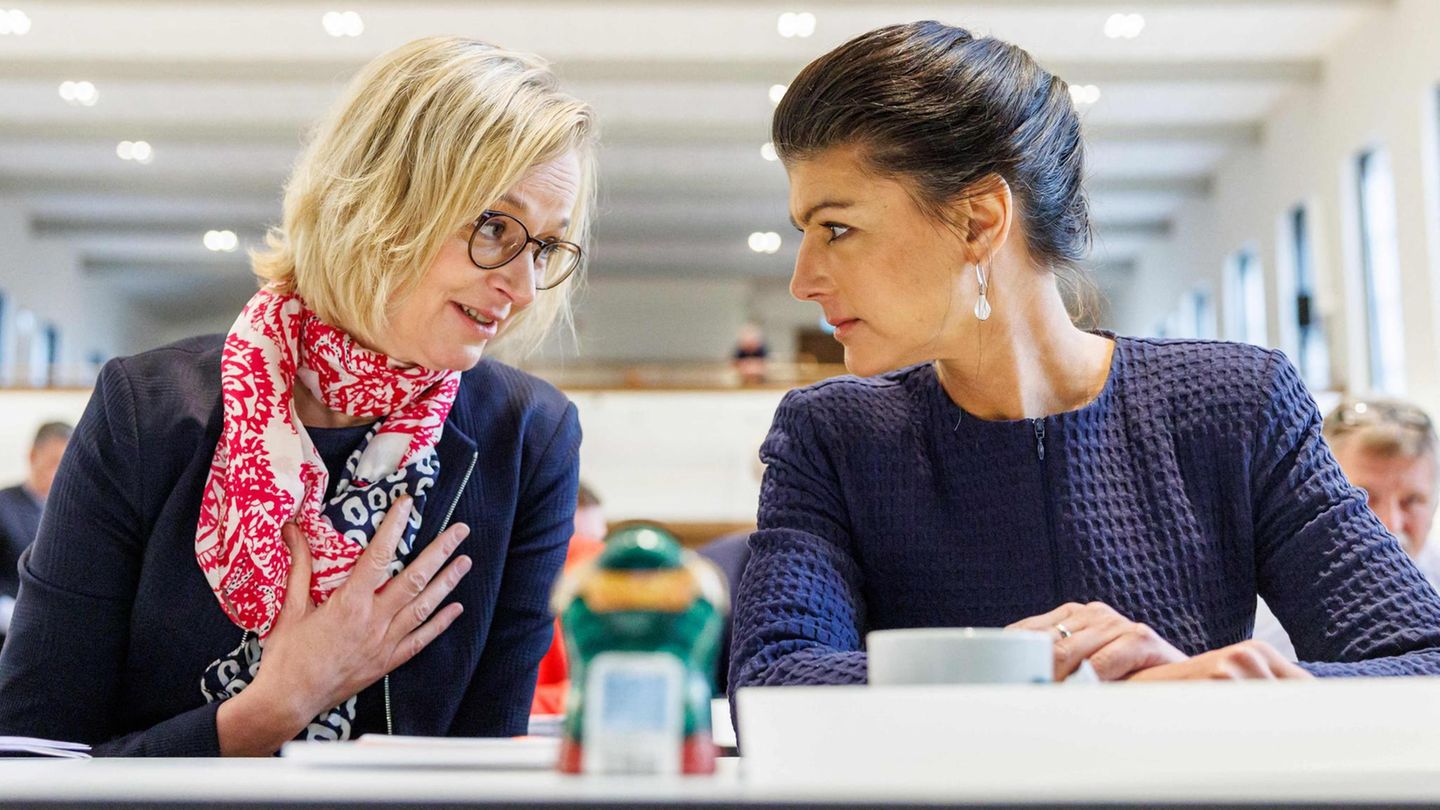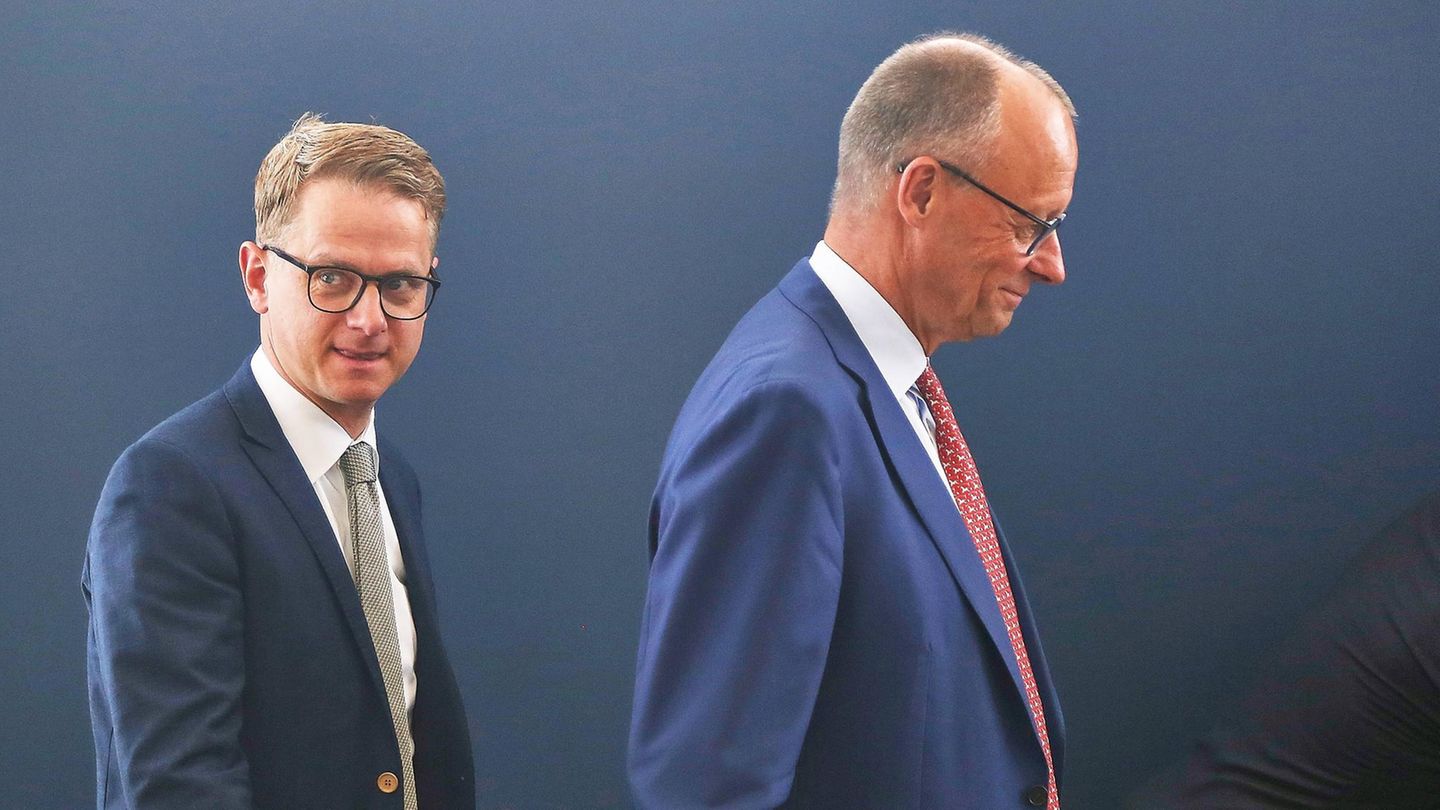Alliance Sahra Wagenknecht
Showdown in the BSW: Is the coalition in Thuringia now bursting?
Copy the current link
Add to the memorial list
Sahra Wagenknecht against Katja Wolf: On Saturday there is a preliminary decision on the existence of the Thuringian bromper coalition-and the future of the BSW. Why is that?
When the up to 130 members of the Thuringian BSW gather in Gera on Saturday morning, it is significantly more than the dramatic struggle for the state party tip. It is about the coalition of the CDU, SPD and BSW in Thuringia and whether and how the BSW can continue after the failure in the Bundestag election. And what else is about Sahra Wagenknecht.
The strategic conflict of interest is the same as before the Thuringian coalition formation last autumn. What has priority? The success of the populist federal party? Or the government construct in Thuringia? For the chairwoman of Wagenknecht, the pure party and power teaching takes action- for state chief Katja Wolf, on the other hand, the CDU-led state cabinet, which she belongs to as Vice President and Minister of Finance.
If Wagenknecht made it on Saturday with the opposing candidates she supports Wolf, the BSW in Thuringia would be in the medium term before the coalition exit and the division. On the other hand, Wolf also defends this attack, Wagenknecht’s Nimbus would finally be damaged. Either way, the power struggle will continue.
The history of the conflict
Everything had started so hopeful. When the then Eisenach Mayor Katja Wolf from the Left Party joined the BSW just founded in January 2024, Wagenknecht was thrilled despite all the opposite contradictions. A popular political professional as a top candidate for the state election in Thuringia: what a gift.
However, the stronger the BSW became in the surveys, the clearer it became that the BSW in Thuringia – similar to the parallel elections in Saxony and Brandenburg – would be used for government majorities. Even then, Wagenknecht feared for the radical populist profile of her party and provided unfulfilled conditions. For example, CDU and SPD should speak against arms deliveries to Ukraine and condemn the deployment of US rockets in Germany.
After the election successes – in Thuringia, the BSW came up with 15.8 percent on its best result – the federal executive board tried to make the explorations more difficult. In Brandenburg, however, SPD Prime Minister Dietmar Woidke was so smooth that Wagenknecht could do nothing. In Saxony, she successfully strengthened the BSW to cancel the conversations with the CDU and SPD. It should also run in Thuringia-but Wolf and her co-state chief Steffen Schütz ignored the Veto from Berlin. They wanted to rule.
And so the first power struggle began in November. Wolf was also brutally attacked by the federal board. At the same time, Berlin took around 30 new members in Thuringia past the top of the country to postpone the majorities in favor of Wagenknecht. Schütz recently called this “Soul acquisition”.
But a few weeks before the decisive state party conference, the traffic light coalition burst in Berlin. At this critical moment, Wolf drove to Saarland to Wagenknecht and made her a formula compromise. The chairman accepted him in view of the now upcoming Bundestag election campaign and even campaigned for the coalition. The state government was formed in December.
The targeted escalation
But the ceasefire only lasted until the Bundestag election on February 23. After the BSW had missed the move in parliament by around 9,500 votes, Wagenknecht immediately made the Thuringian government participation responsible for this: Wolf had reached too little to the CDU and SPD.
The only survival strategy of the BSW: In the four state elections in 2026, the party is to move in at least in the parliaments in Saxony-Anhalt and Mecklenburg-Western Pomerania. According to the historical model of PDS and AfD until the Bundestag election in 2029, the historical model could continue to grow as an Eastern protest party.
But Wagenknecht wants to lead a fundamental-opposite election campaign again-and expressly against a federal government, which then presumably heads a CDU Chancellor Friedrich Merz. In view of a CDU-BSW SPD government in Thuringia, this would be rather difficult.
This is the main reason why Wolf is to be dismantled. The federal executive board supports several martial candidates against the head of the state. Official reason: As members of the state government, you and your co-boss Schütz could no longer effectively lead the party structure. In order to strengthen the argument, the BSW Vice-Government head Robert Crumbach was made available in Brandenburg to provide his state chairmanship.
But Wolf doesn’t want to give way. In a tactical maneuver, Schütz recently refrained from the CO chair, whereby they immediately presented a pleasant successor candidate.
The consequences for Sahra Wagenknecht – and Thuringia
The outcome of the state party day is open. Three scenarios are conceivable. Scenario 1 is currently most likely: Wolf is in office and gets the new co-chair she wanted. Then Wagenknecht would have lost for the time being, the coalition would be reasonably certain. The power struggle would continue.
Scenario 2: Wolf stays in office, but as co-boss, the opposite candidate Anke Wirsing is chosen aside. With the member of the state parliament, Wagenknecht would have a loyal ally in the Landespitze – and in the coalition committee. The first coalition crisis including potential exit would only be a matter of time. It is quite possible that it would also come to divide the state party.
Scenario 3 is at least not excluded: Wolf is voted out against her will. It would have lost a large part of her authority as a member of the government and would have been exposed to the claims for withdrawal. The coalition crisis immediately entered.
What would a coalition break would mean?
Wagenknecht denied all destruction plans in an internal member on Thursday evening. “This media staging harms our party and does not correspond to reality,” she wrote. “Our party needs strong government members and a confident state board to represent BSW positions in the best possible way.”
In fact, Wagenknecht’s goal was always the federal government. In her view, a Thuringian coalition break would be a necessary collateral damage. The side effect: The federal leaders could announce to its members and voters that the BSW provides its principles on government posts.
And Thuringia? Most of the parliamentary group still stops at Wolf. In case of doubt, most MPs should prefer to leave the BSW and continue to support the government. Maybe Wolf and Schütz even stayed minister.
The lack of votes in the state parliament could make up for the left. The CDU-BSW SPD coalition under Prime Minister Mario Voigt is already only 44 of the 88 seats, i.e. on a stalemate. The state budget could recently only be adopted with the help of voices from the left faction.
But the risk would stay great. The largest faction in the Thuringian state parliament is only waiting for her chance of power: it is the AfD – led by Björn Höcke.
Source: Stern
I have been working in the news industry for over 6 years, first as a reporter and now as an editor. I have covered politics extensively, and my work has appeared in major newspapers and online news outlets around the world. In addition to my writing, I also contribute regularly to 24 Hours World.






